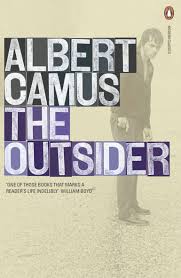Our book group choice for August 2004 is The Outsider by Albert Camus. The first of Camus’ novels published in his lifetime, the story follows Meursault, an indifferent settler in French Algeria, who, weeks after his mother’s funeral, kills an unnamed Arab man in Algiers. The story is divided into two parts, presenting Meursault’s first-person narrative before and after the killing.
The novel begins with Meursault’s mother’s funeral. He is indifferent to her death, and he does not cry. This indifference alienates the people around him, who expect him to be more emotional. Meursault then goes on a seaside vacation with his friend Raymond Sintes. Raymond gets into a fight with an Arab, and Meursault agrees to help him get revenge. They go back to the beach, where Meursault shoots and kills the Arab.
Meursault is arrested and charged with murder. He is found guilty and sentenced to death. Throughout his trial, Meursault refuses to show remorse or apologize for his actions. He does not believe that he has done anything wrong, and he does not understand why the people around him are so upset.
The Stranger is a complex and challenging novel that explores a number of philosophical themes, including the absurdity of life, the nature of justice, and the importance of individual freedom. The novel has been praised for its stark and powerful prose, its exploration of existentialist ideas, and its depiction of the outsider figure.
One of the most striking things about The Stranger is Meursault’s indifference. He does not seem to care about anything, not even his own mother’s death. This indifference alienates the people around him, who cannot understand why he does not behave in a more conventional way. However, Meursault’s indifference is not a sign of weakness or apathy. It is simply a reflection of his belief that life is meaningless.
Discussion Questions
- How does the weather, and in particular, the sun, affect Meursault’s mood and behavior? Why do you suppose it has any effect at all? Can Meursault truly believe that the scorching sun is a valid excuse for murdering the Arab?
- The Outsider is divided into two parts, why? Do you see any structure created – outside of the two parts – that is marked by the three deaths of the text?
- What role do concepts like “detachment,” “alienation,” “acceptance,” and “society” play? How is absurdity reflected in (a) the events in Meursault’s life, (b) the relationships Meursault finds himself in, and (c) the attitudes with which Meursault faces, and subsequently rejects, the world?
- How does Meursault change as an individual from the beginning of the book to the very end? How do we see these changes? Are Meursault’s thoughts and feelings about death, for example, noticeably different by the end of the text? What about religion? Women?
- Of all the relationships presented in the book, which would you say is the most loving? Deep? Loyal? Casual? Sexual? Complex? Rooted in friendship and companionship? Indifferent? Uninteresting? Shallow? Sad?
- Does Meursault ultimately triumph?
- Does Meursault overcome society’s judgment, and thereby, its shackles? Or is it more important that he rebelled against conformity? And what’s up with him wishing for a large crowd of hating spectators at his execution?

